Key takeaways:
- The future of DNA testing promises advancements in accessibility, personalization, and the potential to understand health traits and ancestry more deeply.
- DNA testing offers benefits such as discovering relatives, uncovering health insights for proactive management, and enhancing appreciation for cultural heritage.
- Ethical considerations include concerns about data privacy, the implications of consent, and the societal impact of revealing genetic predispositions.
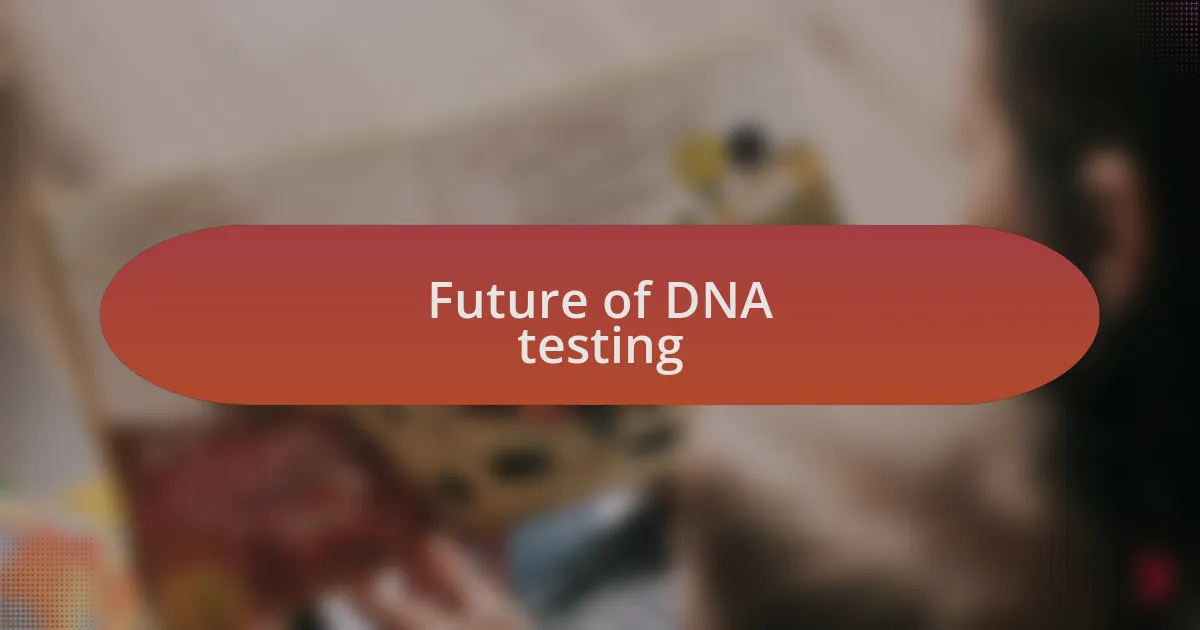
Future of DNA testing
As I reflect on the future of DNA testing, I can’t help but feel a mix of curiosity and apprehension. Will we soon unlock secrets about our ancestral connections that have remained buried for generations? I remember the excitement I felt when I first discovered connections to relatives I never knew existed. Imagine what might come next: easily accessible tests that can even reveal cultural influences within our DNA.
The technology is evolving rapidly, and I predict we’ll see more comprehensive analysis available at lower costs. In the coming years, personal genomics could shift from a niche interest to a fundamental part of our identity. When I think about the implications of this shift, I wonder how it will impact our understanding of health traits or inherited diseases. What if every person could manage their health proactively rather than reactively?
Moreover, with advancements in AI and machine learning, I foresee predictive algorithms being integrated into DNA testing. Picture having a personalized blueprint for your health and ancestry, tailored to your unique genetic makeup. It’s a thrilling yet daunting thought: as we glean insights from our forebears, how much control will we take of our genetic legacy?
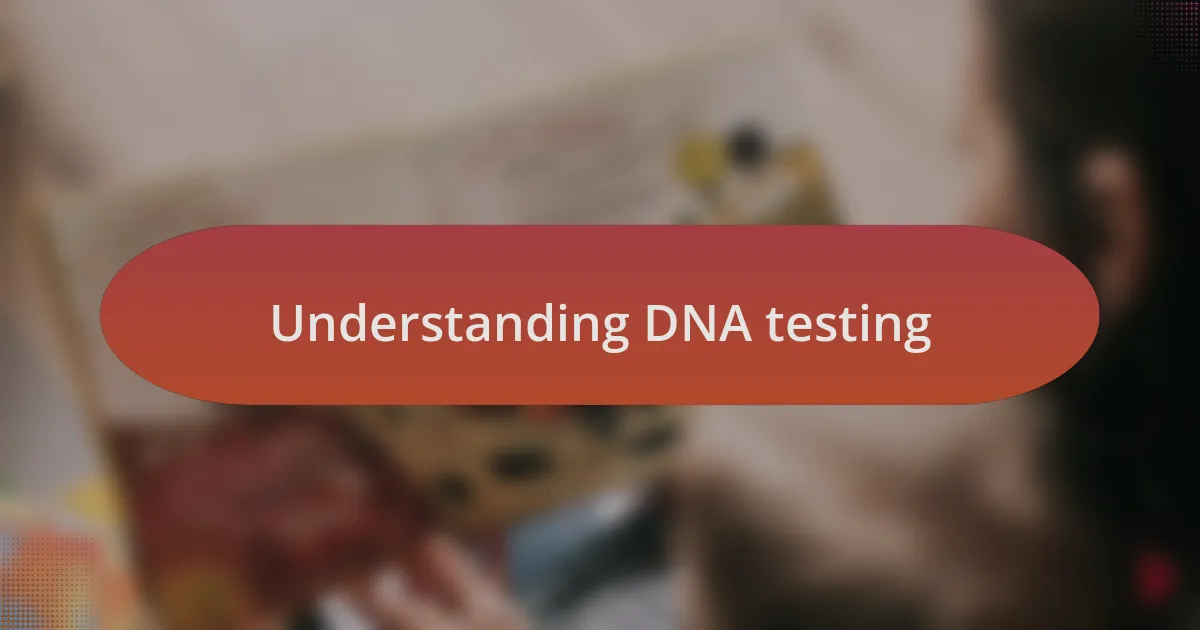
Understanding DNA testing
DNA testing is essentially a way to analyze the genetic material inherited from our ancestors. When I received my first DNA results, it felt like peering through a window into my family’s past. I had always known I had some Italian heritage, but seeing it confirmed in data made it so much more real. This excitement is part of what draws many into genealogy; the idea that we can uncover not just where we come from, but who we are.
Understanding DNA testing also means recognizing the different types of tests available. While some focus on ancestry, others can provide insights into health risks and traits. I remember speaking with a friend who hesitated to take a health-related test due to fear of the unknown. It’s a valid concern—what if the results revealed something that changed how she lived her life? This interaction made me realize that every test carries an emotional weight, as it can challenge our perceptions of identity and health.
Additionally, as technology advances, the analysis can become incredibly detailed. What strikes me is how we can trace not only our lineage but also the geographic and cultural contexts of our ancestors. When I dove deeper into my results, it was fascinating to see not just the regions my DNA came from, but also the historical migrations that shaped my lineage. It prompted me to think: how can we use this newfound knowledge to preserve our heritage while navigating our modern lives? The potential for personal growth through this understanding is immense.
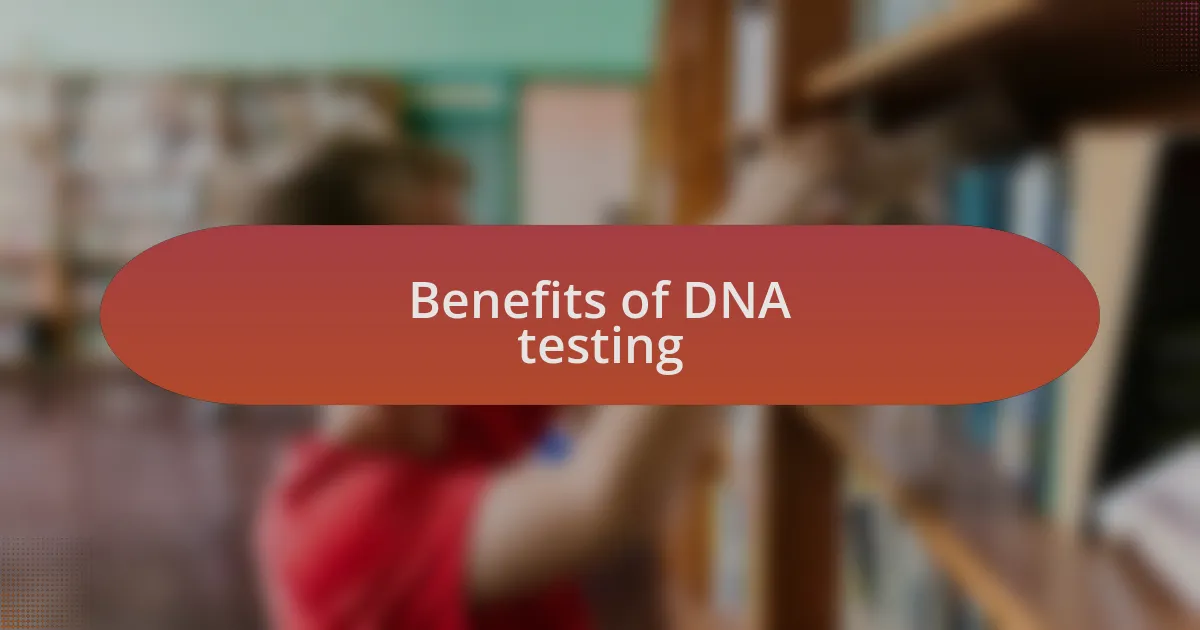
Benefits of DNA testing
One significant benefit of DNA testing is the ability to discover and connect with distant relatives, something I experienced firsthand. After my own test, I was surprised to find a third cousin who had a wealth of information about our shared ancestry. It was an incredible experience to exchange stories and build a more complete family tree, reinforcing the idea that our connections extend beyond just immediate family. Have you ever thought about how many relatives might be out there, waiting to be discovered?
Another advantage of DNA testing lies in its potential to uncover health insights that can guide lifestyle choices. For instance, a family member learned about their predisposition to certain conditions, allowing them to take proactive steps in their health management. This kind of knowledge can empower individuals to make informed decisions, enhancing not only their health but also their overall quality of life. Wouldn’t it be comforting to know you could take preventative measures before health issues arise?
Additionally, DNA testing can deepen one’s appreciation for cultural heritage. I recall the joy I felt when I discovered unexpected ties to a specific region. This revelation inspired me to explore the traditions and foods of that culture, leading to a newfound passion for cooking and learning about my lineage. Isn’t it fascinating how a simple test can spark a journey into our roots and inspire a connection to our heritage that we may not have previously thought possible?
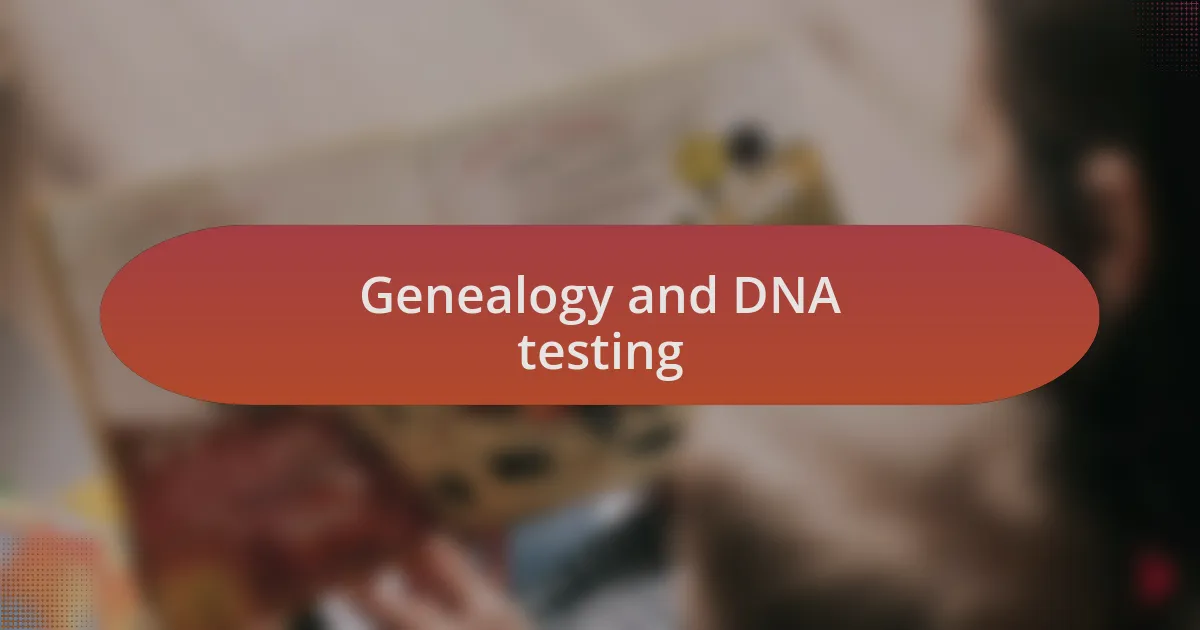
Genealogy and DNA testing
When I first delved into DNA testing for genealogy, I didn’t anticipate the emotional rollercoaster it would evoke. Discovering family secrets from generations ago can be thrilling yet overwhelming. Have you ever found out something about your ancestry that changed how you view your family story? For me, the revelations were eye-opening and added layers of context to my family’s history.
Moreover, the technology behind DNA testing is evolving rapidly, offering richer insights than ever before. For instance, one recent test I took included an option for ethnic breakdowns that I hadn’t seen in earlier tests. The joy of discovering that I had roots in a region I once thought was purely mythic felt almost like a treasure map leading me to explore those distant lands. Isn’t it remarkable how the past can shape our present understanding of identity?
As I navigated this complex landscape of genetic connections, I found that DNA testing also facilitates meaningful conversations about family history with older relatives. Just the other day, while discussing our results, my grandmother shared stories that filled in gaps I hadn’t even known existed. It made me realize how one test can bridge the generations, helping us weave a more cohesive narrative of who we are today. What stories might your family have waiting to be uncovered?
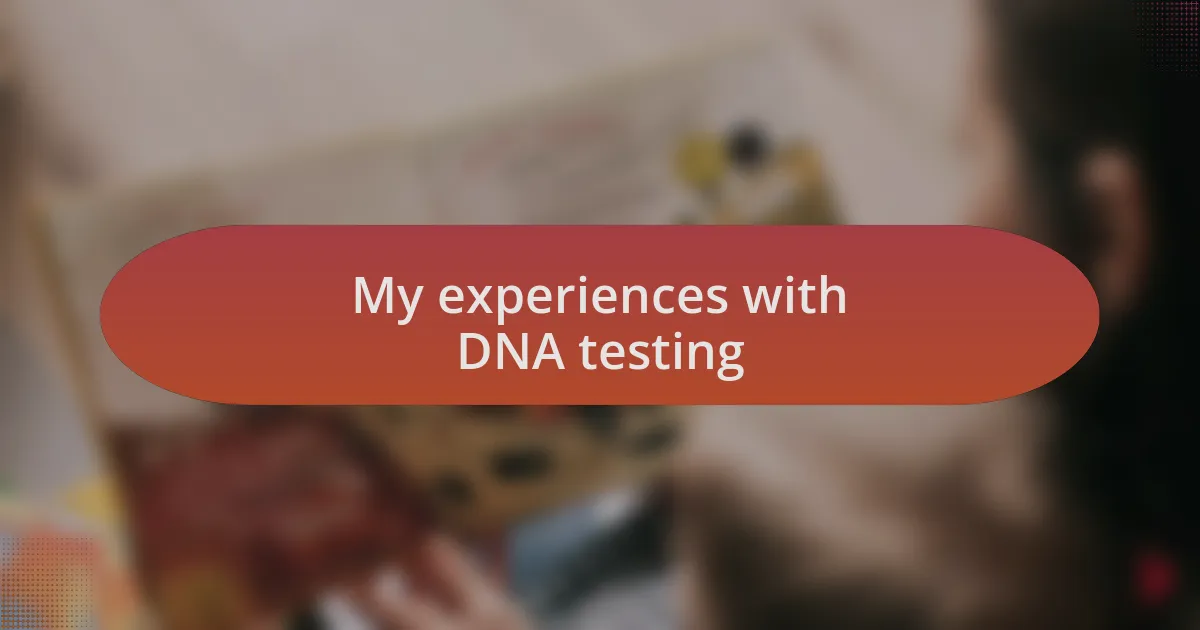
My experiences with DNA testing
Trying DNA testing for genealogy was a game-changer for me. I remember the day I received my results; a mix of excitement and anxiety washed over me. When I saw the ethnic percentages, I was taken aback—certain regions popped up that I had never even considered part of my lineage. Was I really part Scandinavian? This moment sparked a curiosity that propelled me into research I hadn’t originally planned on pursuing.
One unexpected aspect was the chance to connect with distant relatives. Through a genealogical forum, I met a third cousin who lived thousands of miles away. We shared our DNA test results, and I felt an instant bond as we pieced together our family tree. I realized how easily these connections form; it made me wonder: how many other living relatives are out there, waiting to share their pieces of our shared history?
As I unraveled my family’s stories, I encountered some surprising truths that led to profound reflections on identity and belonging. Learning about an ancestor who migrated during a turbulent time ignited thoughts of resilience, leaving me pondering how those experiences shape the person I am today. Have you ever considered how your ancestors’ journeys might influence your own path? It’s that connection—across time and miles—that continues to inspire me.
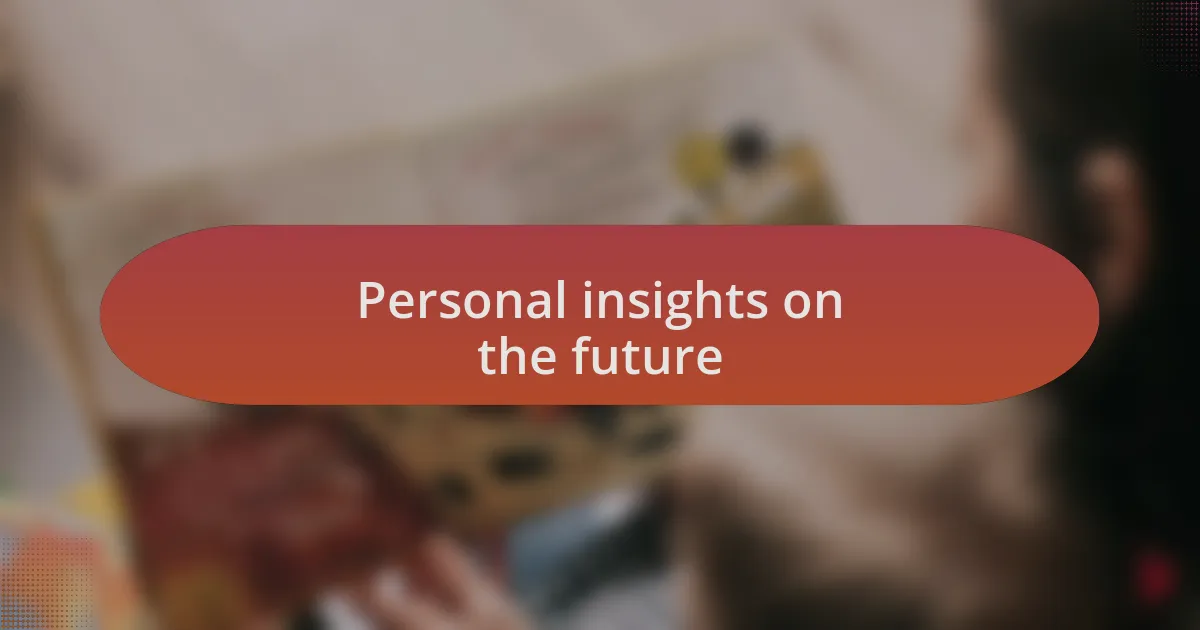
Personal insights on the future
As I look to the future of DNA testing, I can’t help but feel a sense of wonder at its potential. One intriguing thought is how advanced algorithms could eventually offer even more personalized insights into our health and ancestry. Imagine receiving not just ethnic information, but also tailored recommendations for lifestyle choices based on your genetic makeup. Wouldn’t that be fascinating?
I also ponder the ethical implications of these advancements. With the convenience of tracing our roots comes a responsibility to handle our data carefully. I often reflect on conversations I’ve had with others about whether they would share their genetic information with companies knowing the potential risks. How much of our privacy are we willing to trade for knowledge?
Moreover, the prospect of exploring our family histories through interactive platforms excites me. Envision a future where we can virtually meet our ancestors or overlay our genomes on historical events. There’s something deeply moving about the idea of accessing our lineage in such an immersive way. Could these experiences foster a greater sense of community and understanding among diverse cultures?
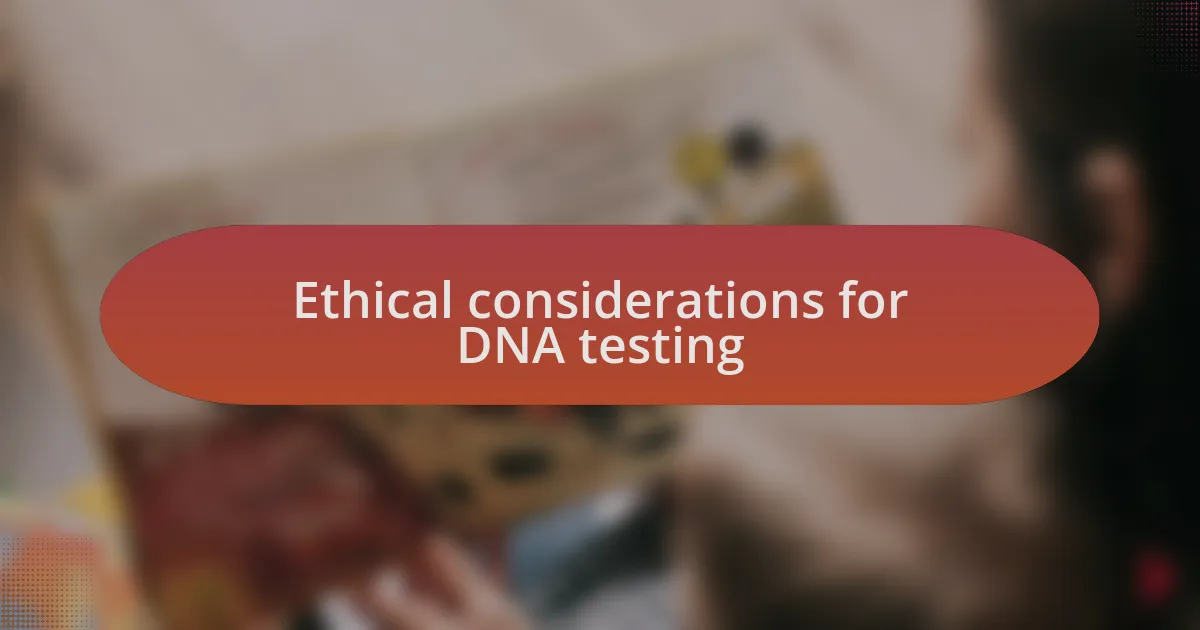
Ethical considerations for DNA testing
When considering the ethical implications of DNA testing, it often brings to mind a conversation I had with a close friend who hesitated to submit her genetic information. She raised valid concerns about how companies might use this data, especially if it fell into the wrong hands. It’s a sobering thought: what happens if our most personal information is accessed without our consent?
The notion of consent is paramount in the realm of genetic testing. Just because we can uncover our ancestry doesn’t necessarily mean we should. For instance, I remember feeling a mix of excitement and anxiety when I first learned about a long-lost relative through DNA testing. What if this discovery unearthed family secrets or caused emotional distress? Understanding that our data might also affect living relatives adds another layer of complexity to the decision to test.
Moreover, the implications of genetic testing stretch beyond individual privacy concerns. I often reflect on the societal impact of how we share our findings. Are we prepared to face potential discrimination based on our genetic predispositions? There’s a delicate balance between knowledge and the fear of stigmatization, and navigating this landscape requires careful thought, not just for ourselves but for family and communities as well.